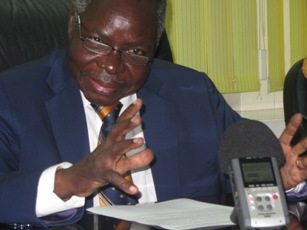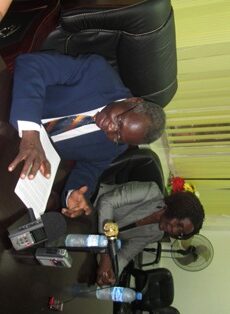South Sudan hosts consultative conference for fragile states
By Ngor Arol Garang
19 October 2011 (JUBA) – A two day consultative conference on fragile states concluded in South Sudan’s capital Juba on Wednesday, as the economic situation in the new nation worsens, with inflation rising over 60%.

South Sudan’s minister of finance and economic planning, Kosti Manibe, said on Tuesday that the conference was organised for the 17 countries to share ideas on how to make best use of donors and propose new ways of working with development partners.
Kosti said South Sudan has been an active participant in the ‘g7+’ from the beginning and has been actively promoting the ‘g7+ agenda,’ of encouraging donors to address issues of fragility and build state institutions simultaneously.
The conference provided an opportunity for ‘g7+’ members to agree on a common position for the fourth highest level forum on aid effectiveness in Busan, South Korea, to lobby for more effective aid provision to fragile states.
The 17 fragile states participating in the conference were: Afghanistan, Burundi, Central Africa Republic, Chad, Ivory Cost, the Democratic Republic of Congo, Ethiopia, Guinea Bissau, Haiti, Liberia, Nepal, Papua New Guinea, Sierra Leone, The Solomon islands, Somalia, South Sudan, and Timor-Leste.

Inflation has reached 61.5% in South Sudan, leading the minister to acknowledge that the conference has given his ministry an opportunity to find ways to reduce the high cost of living.
The South Sudanese pound (SSP), which was introduced shortly after South Sudan’s partition from north Sudan in July, has depreciated in value, with some in Juba claiming that $1 can be bought for over SSP400.
Africa’s newest country suffers from unreliable electricity supplies, severe food shortages and rising commodity prices which have eroded the country’s purchasing power. Despite being an oil exporter and relying almost solely on oil revenue to fund its government, South Sudan has to import petrol as it does not have its own refinery.
Representatives from the International Monetary Fund, World Bank and key departments in the South Sudanese government also attended the conference to plan how to make life more affordable to citizens.
“The issue is getting serious. The central bank governor of South Sudan and I will both attend the conference to see what we can do to address the situation,” a minister told journalists he as left the press briefing hall on Tuesday evening.
The South Sudan National Bureau of Statistics in a report released last week attributed rising food prices to the multiple check points found on main supply routes spreading across the country in the ten states.
The September increase to 61.5% inflation, from 57.1% in August, has raised concerns that prices could go up further unless the South Sudanese pound is stabilized and infrastructure is dramatically improved.
“This is the first time the country is experiencing such an inflationary rate. Sudan has never witnessed such an increased in food prices even when it was one country. Never, ever has the country experienced such economic challenge,” said Deng Tiel Both, a retired civil servant, who worked to create South Sudan’s high executive council after the 1972 Addis Ababa peace agreement that ended South Sudan’s first civil war with Khartoum.
South Sudan’s economic woes can be traced to June, when fighting erupted in South Kordofan, a north Sudanese state on the shared border, and before that when the northern army took control of the disputed territory of Abyei in May. Since this time, trade with north Sudan has dried up, leaving the south short of vital goods. The civil servant also blamed the country’s multiple taxes, transport costs and regular legal and illegal check points for increasing costs.
Mading Machol Yak, who returned to South Sudan from the US, told Sudan Tribune that the failure of the government and the private sector to create more jobs and strengthen small-scale agriculture and livestock keeping is another major cause of inflation. “Without it, it is impossible to expand the domestic market and trade because of low purchasing power,” he argued. “The small elite class that depends on shopping malls has a preference for imported goods and services and that contributes to inflation.”
“What is needed is the expansion of local production for local consumption,” Machol concluded. “This depends on having masses of people who are employed and have dispensable incomes to purchase not only food but other necessities.”
(ST)

whatsayyou
South Sudan hosts consultative conference for fragile states
Mr minister of finance.
it is good but dicussing these problems alone will not help, please lets do something right now. Let your ministry help to reduce high food shortages by geting involve in bussiness that will sale goods in affordable prices.second, control money in the bank lack of control has raise the dollar high and eventually to high prices in eveything we buy.